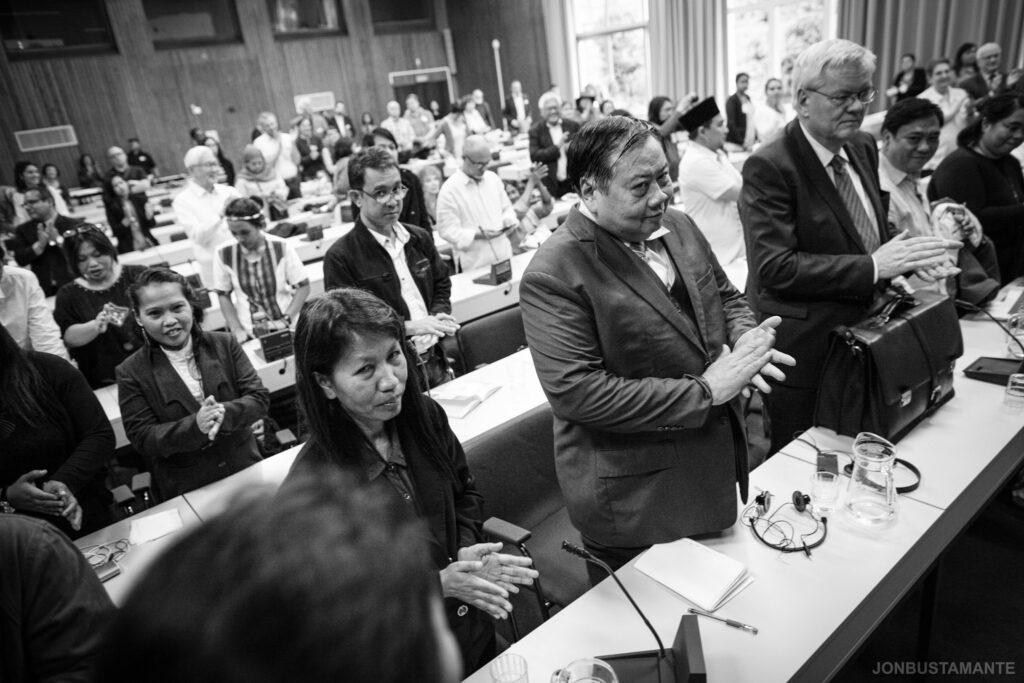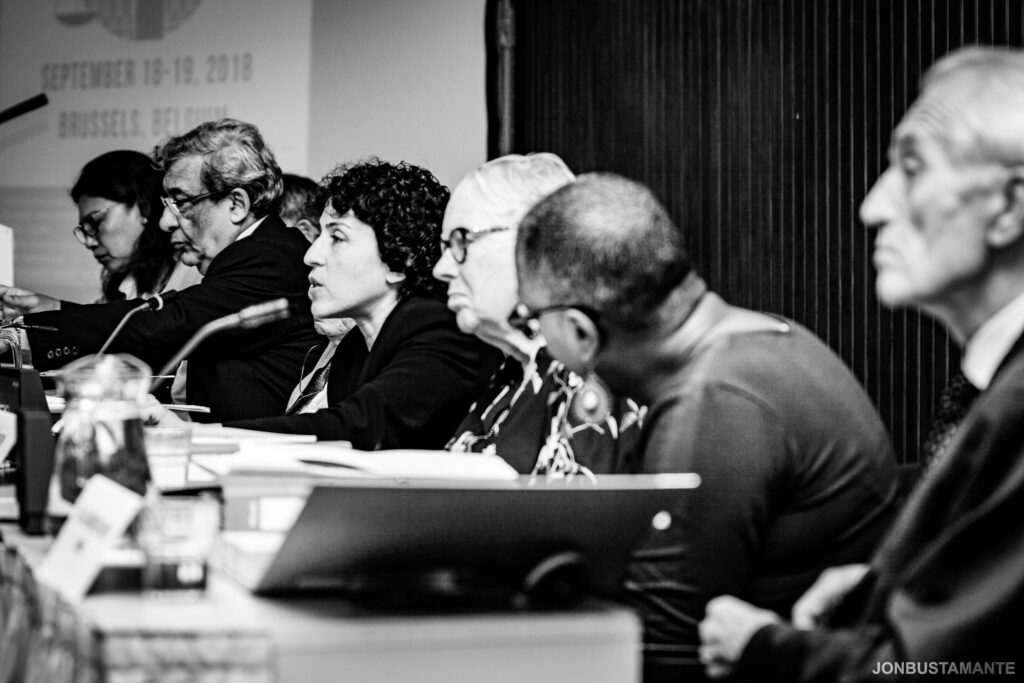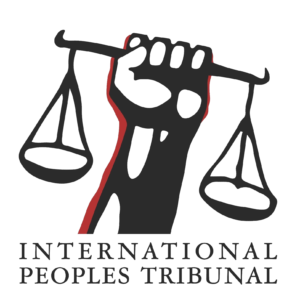KATARUNGAN: The Filipino People vs the US Government and the Marcos and Duterte regimes
A Primer on the International War Crimes Tribunal on
the US-directed Counterrevolutionary War in the Philippines
1. What is the International People’s Tribunal?

The International People’s Tribunal 2024 is a quasi-judicial forum convened by the International Association of Democratic Lawyers (IADL) and the Friends of the Filipino People in Struggle (FFPS) to investigate and address alleged war crimes committed by the US-supported Marcos and Duterte regimes. It serves as a platform for victims and advocates and their organizations to present evidence and legal arguments related to the crimes committed against the Filipino people.
2. Why a people’s tribunal?

Unlike traditional courts or existing international accountability mechanisms that are easily influenced by imperialist interests, a people’s tribunal operates independently from governments and inter-governmental institutions alike. It receives its mandate from the toiling masses of workers, peasants and other democratic forces deprived of their rights. Represented by their respective national and social liberation movements, the oppressed peoples of the world wield the peoples’ tribunal as a means to exact accountability on their oppressors. As a court of people’s opinion, the IPT’s findings carry significant political and moral weight. Its significance as a peoples’ tribunal lies in its facility as a moral and political platform for victims, advocates, and national and social justice movements seeking justice and accountability.
3. Have there been precedents for similar peoples’ tribunals?
The IPT 2024 follows a long history of peoples’ tribunals that have shaped international public opinion and tried various regimes on crimes against humanity. The IPT takes inspiration from the Russel Tribunal, also known as the International War Crimes Tribunal, which held two sessions in 1967 to expose the war crimes committed against the Vietnamese people. This was succeeded by the Permanent Peoples’ Tribunal (PPT) that was founded in June 1979 in Italy by law experts, writers, and other intellectuals.
- October 30-November 1, 1980: In 1980, the Permanent Peoples’ Tribunal convened its First Session on the Philippines to hear the case against the dictator Ferdinand E. Marcos Sr., at the suite of the National Democratic Front of the Philippines (NDFP) and the Moro National Liberation Front (MNLF). It was the first international quasi-juridical body to condemn the US-sponsored Marcos dictatorship.
- August 19, 2005: The series of peoples’ tribunals on the Philippines first took on an international character on August 19, 2005, in Quezon City, Philippines. The IPT 2005 delivered a guilty verdict against former president Gloria Macapagal-Arroyo for gross human rights violations against the Filipino People.
- March 21-25, 2007: In recognition of the urgency of the appeal of the Initiating Group of Philippine Organizations, the PPT decided to convene the Second Session on the Philippines indicting the US-Backed Arroyo Regime for Human Rights violations, Economic Plunder and Transgression of the Filipino People’s Sovereignty on March 21-25, 2007, in the Hague, the Netherlands.
- July 16-18, 2015: The IPT 2015 was held in Washington, D.C. to address crimes against the Filipino people by former president Benigno S. Aquino III and the US Government, as represented by then President Barack Obama. The IPT 2015 found that the Aquino regime, with support from the US through military intervention, economic and environmental exploitation, and imposition of neoliberal globalization, committed systematic violations of civil, political, economic, social and cultural rights of the Filipino people.
- September 18-19, 2018: The IPT 2018 was held in Brussels, Belgium. The tribunal issued a verdict at its conclusion finding former president Rodrigo Duterte and then US president Donald Trump responsible for human rights violations against the people of the Philippines. Experts and victims of human rights violations presented testimonies on poverty, homelessness, the ‘drug war’, political repression, extrajudicial killings, the oppression of women and a range of other issues.
- May 17-18, 2024: This year, the IPT will once again convene to hear the case of the Filipino people versus the US-backed counterrevolutionary war of the Duterte and Marcos regimes and their violations of International Humanitarian Law.
4. Why focus on the war crimes of the US-Marcos and US-Duterte regimes?
The IPT 2024 seeks to address the war crimes committed by the US-Duterte regime (2016-2022) and the current US-Marcos regime (2022-present) under their respective ‘counterinsurgency’ operations patterned after the US National Security Strategy and the US ‘Counterinsurgency Guide’. The Marcos-Duterte ruling clique continue to cling to power, roaming free with impunity and complete disregard of international humanitarian law. The period in question is marked by countless cases of political killings, enforced disappearances, torture and widespread and systematic suppression of dissent with the full support and backing of the US government.
Violations of International Humanitarian Law under the US-Duterte and US-Marcos regimes
| Violations | US-Duterte Regime (July 2016 – June 2022) | US-Marcos Regime (July 2022 – November 2023) |
| Extrajudicial Killings | 422 | 87 |
| Enforced Disappearances | 21 | 12 |
| Illegal or arbitrary arrests | 2,957 | 316 |
| Fake or forced surrender | 3,991 | 552 |
| Bombings | 378,203 | 22,391 |
| Forced evacuation | 481,918 | 24,670 |
| Indiscriminate Firing | 20,348 | 39,769 |
| Threats, harassment and intimidation | 2,890,623 | 1,609,496 |
5. What specific war crimes are being investigated?
The tribunal will examine violations of international humanitarian law both as to the means and methods of warfare and the objects and subjects of attack, including extrajudicial and summary killings of civilians and hors d’ combat, desecration of remains of combatants, massacre of civilians and other forms of collective punishment, torture, enforced disappearances, mass arrests, indiscriminate firing, indiscriminate aerial bombing of communities and use of white phosphorus bombs, hamletting, terrorist labelling and use of repressive terror laws, assassination of civilians, attacks on schools, fake or forced surrenders, attacks against peace consultants and other forms of suppression.
6. How will the IPT proceedings be conducted?
The IPT operates as a quasi-legal tribunal, following a structured legal process and guided by the standards of due process and credible evidence. The proceedings aim to ensure a fair and impartial process by appointing a diverse panel of expert jurors and providing opportunity for the defendant/s to be heard.

The tribunal, with the assistance of an international team of prosecutors, will involve the presentation of live and recorded testimonies from witnesses and victims, analyses and opinions by experts, and submission of sworn statements, studies, reports, and other documents.
A panel of jurors, consisting of legal experts and prominent human rights personalities, presides over the tribunal. After due deliberation, a summary and preliminary verdict shall be presented based on evidence and inputs presented to them as well as those submitted on record. A full and elaborated verdict shall be issued in due time.
While the IPT’s findings are not legally binding, they contribute to the documentation of historical truths and shape international public opinion and could be a basis for future legal action.
7. Who will be participating in the tribunal?
The IPT will include a panel of international jurors, a team of international prosecutors, legal experts, resource person, amicus curiae, and witnesses.
The panel will consist of individuals with recognized expertise in human rights, international humanitarian law, and other relevant fields. Witnesses will be individuals and/or representatives of groups or organizations who have firsthand experience or knowledge of the emblematic cases under consideration.

8. How can we support the IPT 2024?
Support for the IPT 2024 can come in various forms, including:
- Raising awareness about the importance of the IPT 2024 and its role in exacting the accountability of the US-backed Marcos and Duterte regimes for their war crimes. Please follow us on our social media accounts to help spread the word about the event;
- Organizing local alliances, groupings, as well as events to support the tribunal including webinars, fora, and small discussion groups that can help educating communities and solidarity allies about the grievous war crimes of the US-Marcos and US-Duterte regimes. You can send us an email via [email protected] if you are interested to organize activities in support of the IPT 2024; and
- Mobilizing communities and organizations to join protest actions and political demonstrations in support of the IPT 2024. Please visit the IPT 2024 website to get updates on planned events and demonstrations in the run up to the tribunal.
By combining efforts across these areas, your organization can play a crucial role in supporting the work of the International Peoples’ Tribunal 2024.
You can also follow the IPT 2024’s official social media accounts:
The International People’s Tribunal on the War Crimes of the US-Marcos and US-Duterte regimes represent a crucial opportunity to address historical injustices and exact accountability for their crimes against humanity. By examining the role of the United States in supporting the Duterte and Marcos regimes and holding them accountable to their violations of International Humanitarian Law, the IPT aims to contribute to the ongoing pursuit of truth, justice, and accountability.
For more information, visit www.peoplestribunal.net or email [email protected]

